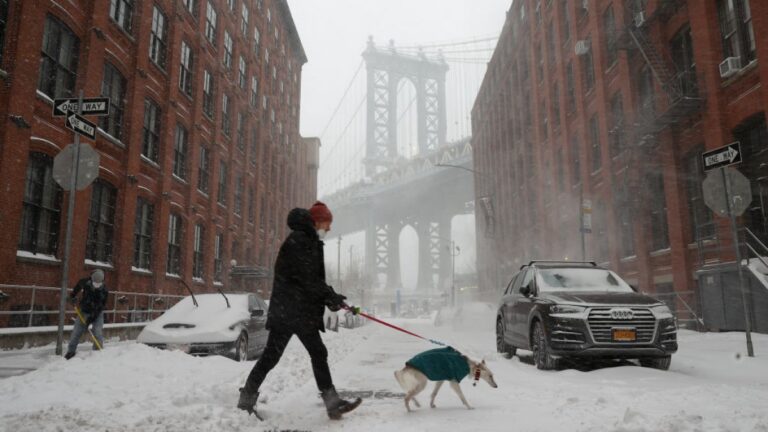What you need to know
- As extreme winter weather and low temperatures threaten many parts of the country in the coming days, it's important to make sure your family, friends, and neighbors are safe. This concern should also apply to your four-legged furry friends.
- Because extreme cold also affects animals, the ASPCA would like to remind pet owners that these weather conditions can be extremely dangerous to their pets.
- The ASPCA and NWS offer tips on how to keep your furry friends safe during harsh winter weather.
The third winter storm in about a week is set to hit the tri-state region on Friday, but before that, the region will be greeted with the coldest air in nearly a year.
As extreme winter weather and low temperatures threaten many parts of the country in the coming days, it's important to make sure your family, friends, and neighbors are safe. This concern should also apply to your four-legged furry friends.
Because extreme cold also affects animals, the ASPCA would like to remind pet owners that these weather conditions can be extremely dangerous to their pets.
“With subzero temperatures and arctic air masses expected to impact various regions across the country this weekend, it's important to protect your pet's health and well-being by preparing your pet for potentially dangerous weather conditions.” said Susan Anderson, Disaster Response Director. The ASPCA National Field Response Team said in a press release that “taking precautions, such as keeping pets safely indoors and having supplies such as extra food and water in case of a power outage, can help in dangerous situations. It can save lives.”
To keep your pet safe during harsh winter weather, the ASPCA recommends keeping the following tips in mind.
- If it's too cold for you, it's probably also for your pet. During inclement weather, your pet should be kept warm and safe indoors. However, if they must be taken outdoors, owners should consider dressing short-haired or small dogs in a coat and boots for short walks. Pet owners should also make sure their furry companion has extra bedding in a warm, dry place off the floor and away from drafts. If you notice discoloration, swelling, or skin ulcers, which are signs of frostbite, contact your veterinarian immediately.
- After a walk, be sure to towel dry your pet and clean its paws and belly. During the winter, pets can step on ice, salt, and chemicals. This is not only painful, but can also be potentially dangerous if ingested. Don't forget to check for cracked paw pads or redness between the toes. Pet owners should consider using boots on their pets.
- have portable pet emergency kit In case you are stuck at home or forced to evacuate. This kit should include essentials such as medical records, water, water bowl, pet food, and at least 7 days worth of necessary pet medications. Your pet must also wear a collar and tag with up-to-date identifying information. If you need to evacuate, never leave your pet behind. If there is a power outage at home, leave your pet (along with detailed care instructions and veterinarian contact information) with a friend or family member.
- All pets, especially small and exotic pets, will need more food and water on cold days, especially if the power goes out. If your pet food is running low and you cannot replenish it, here is a list of common foods that can be mixed with kibble or fed alone in your dog or cat's diet.
- Be prepared in case of a power outage. Figure out in advance which rooms in your house are safe havens (utility rooms, bathrooms, basements, etc., rooms must have no windows). Fill your bathtub and sink with water in advance to ensure water is available in the event of a power outage. Do not place candles around your pet. Use battery-powered lanterns, flashlights, etc. instead. Never use propane-fueled or other portable outdoor heaters indoors.
- During the winter, outdoor cats may take shelter under cars. Before starting the engine, slam the car's hood, giving it a chance to escape.
- Horses require special care during the winter This includes access to additional food, warm water, and suitable shelter from the elements. here Click here for tips on caring for your horse during inclement weather.
When dealing with harsh winter weather, the National Weather Service also offers tips on how to keep your pet safe. Some tips include:
- Never let your dog off the leash on snow or ice, especially during a snowstorm. Dogs tend to lose their sense of smell. Make sure your dog has an ID tag, as more dogs get lost in the winter than during other seasons.
- Never leave your dog or cat alone in the car during cold weather. Keep your pet indoors whenever possible, especially if your pet is sensitive to cold weather due to age, illness, or breed.


